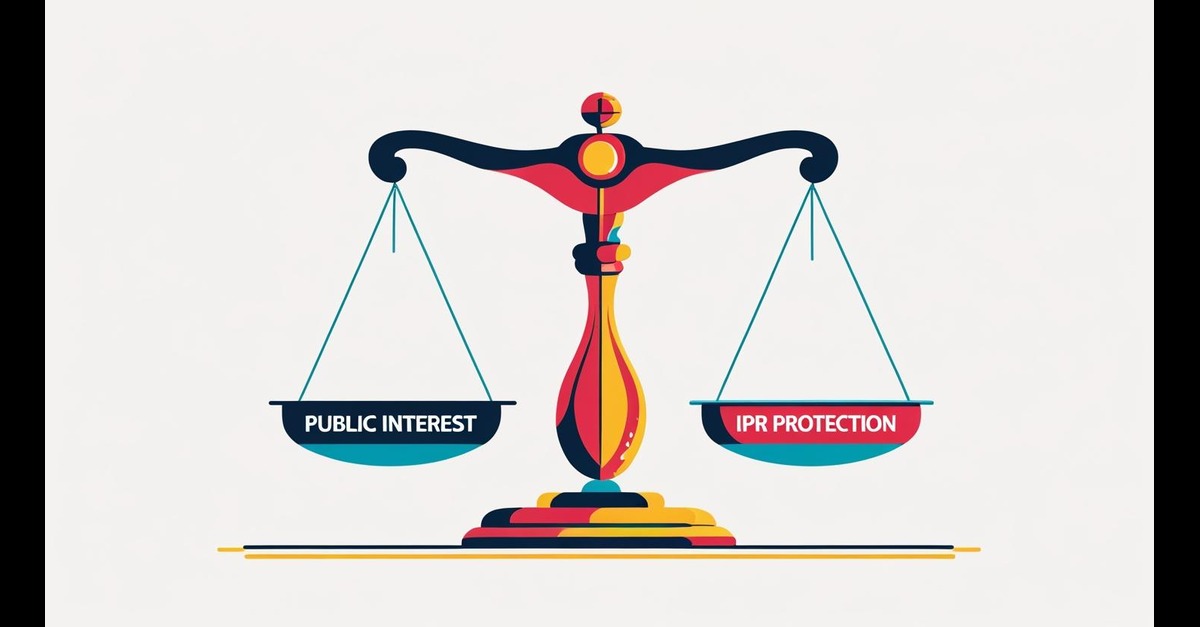ABSTRACT
The paper investigates the intricate relationship between intellectual property rights protection and public interest concerns. The enforcement of IPR which gives innovators and creators exclusive rights needs to maintain equilibrium with societal requirements to access fundamental products especially in the domains of healthcare education and technology. The paper analyzes essential legal standards and global standards together with Indian court decisions to study how Indian laws mediate between supporting innovation incentives and public welfare needs.
INTRODUCTION
The legal system needs Intellectual Property Rights (IPRs) to encourage both innovation and creativity in addition to economic progress. The system provides individuals and corporations with exclusive rights to utilize their inventions and creations. The law faces an essential dilemma because life-saving medicines along with educational resources and essential technologies face restricted access due to exclusive rights.
The Indian legal system has identified this problem since its inception through the Patents Act, 1970 and Copyright Act, 1957. The judiciary has established itself as a key institution which interprets these statutes to maintain both private rights protection and public interest preservation. This article examines the legal and policy mechanisms which work to sustain this fragile equilibrium.
KEYWORDS
Intellectual Property Rights, Public Interest, Patent Law, Compulsory Licensing, Innovation, Access to Medicines, TRIPS Agreement.
MAIN BODY
The IPR principle exists because the reward theory states time-limited monopolies encourage inventors to pursue new innovations. The exclusivity leads to public difficulties in obtaining essential resources which affect health services and educational materials. Indian legislation incorporates multiple protective provisions to resolve these issues. The Indian Patents Act Section 3(d) blocks pharmaceutical patent evergreening and blocks patent approval for minor drug changes.
The judgment of Novartis AG v. Union of India (2013) demonstrates this equilibrium between the two sides. The Supreme Court denied patent approval for a modified cancer drug because the new formula did not enhance the drug’s performance. The judgment demonstrated that patent regulations must not allow businesses to place their commercial interests above public health needs.
The Patents Act includes compulsory licensing as a key method to achieve interest equilibrium through its Section 84 provisions. The Controller General of Patents issued a compulsory license for a cancer drug in Bayer v. Natco (2012) because Bayer set its price too high so Natco could produce and sell its generic version at a significantly reduced price. The ruling stressed that affordability and reasonable public requirement are valid grounds to override patent monopolies.
India’s copyright law contains rules which enable fair use as well as compulsory licensing for educational and non-commercial applications. The Delhi High Court ruled in The Chancellor, Masters & Scholars of the University of Oxford v. Rameshwari Photocopy Services (2016) that students using photocopied academic book sections qualified as fair dealing while serving the broader educational access goal.
The TRIPS Agreement (Trade-Related Aspects of Intellectual Property Rights) allows member states to implement necessary measures that protect public health and serve the public interest especially when dealing with critical sectors.
Critics maintain that pro-public-interest measures could result in diminished foreign investment together with lower research incentives. The Indian legal framework establishes a balanced solution which defends authentic innovation while preventing monopolies from damaging public welfare.
CONCLUSION
India’s legal system regarding intellectual property rights establishes deliberate guidelines which protect innovation rewards while maintaining protection for public welfare concerns. India has established a system through legal interpretation together with statutory measures and global standards which aims to stop IPR monopoly abuse when public health and access to medicines need protection. The system focuses on distributing benefits evenly throughout society to achieve equitable development. The equilibrium between innovation benefits and public welfare duties will remain essential because new technologies along with worldwide challenges will transform the IPR environment.
“PRIME LEGAL is a full-service law firm that has won a National Award and has more than 20 years of experience in an array of sectors and practice areas. Prime legal falls into the category of best law firm, best lawyer, best family lawyer, best divorce lawyer, best divorce law firm, best criminal lawyer, best criminal law firm, best consumer lawyer, best civil lawyer.”
WRITTEN BY HARINI S


